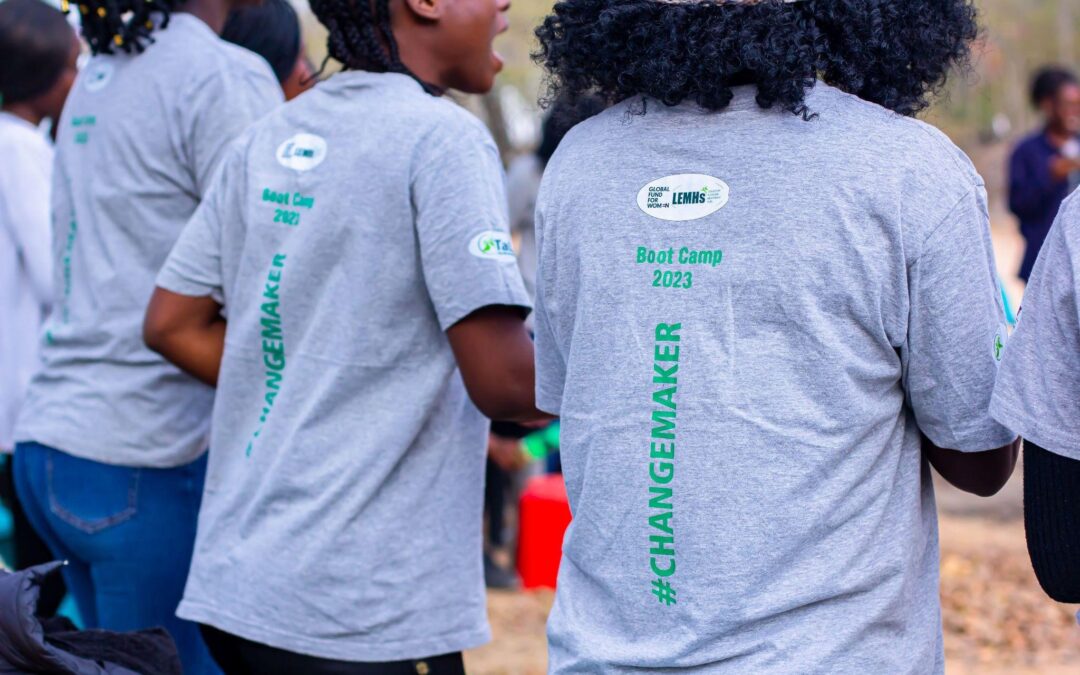From July 24 to August 5, this year’s Leadership Economic Mentorship Hubs (LEMHs) Class (Class of 2023-2024) were at Karimazondo Campsite in Marondera for the Leadership Economic Mentorship Hubs 12-day boot camp. Training went from 8:00 am to 4:00 pm every day as the young women brought on were taught the 12 thematic areas in their curriculum. Facilitators for the program included: Ms Nyaradzo Mashayamombe, TaLI founder and director; Ms Nokuthula Gavaza, resident facilitator and founding director of Unathi Children’s Network Trust; Ms Mirriam Kassimu, SRHR facilitator and full-time Highlanders football coach; Ms Bridgetti Mambondiani, a LEMHs 2022 Alumna and founder of the Junior Court Club; Ms Annah Sande, a LEMHs 2021 Alumna and current candidate for the Proportional Representation Councillor seat in Epworth; and, Ms Gladys Shumbambiri, decorated Entrepreneur and Financial Literacy Coach, along with the TaLI staff, Ms Tatenda Tahla, Ms Chandel Charenzwa, Ms Tanya Mbofana, and Mr Edwin Nathan.
The purpose of this boot camp was to have and complete the first stage of the Leadership Economic Mentorship Hubs year-long programme, Youth Empowered for Growth. This stage is where young women accepted into the programme are trained on advocacy, leadership, and the thematic areas covered by TaLI including, Personal Leadership, Advocacy Planning, Intersectionality, Constitutionalism, Governance and Democracy, Women and Human Rights, GBV, SRHR, ICT, Climate Change, Feminism, Financial Literacy, Media Advocacy, and Movement Building. This boot camp and its training are meant to educate the young women on issues that affect societies and help them identify issues to address in the second stage of the LEMHS program, movement building in their communities (Youth Engaging with Local Leaders).
This year’s boot camp class was composed of 31 girls representing Manicaland, Harare, and the Midlands province. The young women also came from different backgrounds: some were married in their teenage years, young mothers, university students, students that never received an education, young women from rural areas, and some from urban towns. Despite these differences, this class managed to come together for the sake of young women’s empowerment and showed each other love, respect, and kindness in their daily activities. Throughout their training, the young women managed to identify issues in their hometowns of Gweru, Chitungwiza, Shurugwi and Marondera etc…, that they were eager to address during their movement-building stage. These included problems of child marriage, sexual abuse, exploitation from economic lack, lack of Sexual Reproductive Health Rights knowledge, and lack of education for young women. In addition to their learning, the young women built friendship and sisterhood bonds that changed their lives and their perspectives on other young women. They not only learned from our facilitators but also from each other. Whereas some came into the programming judging themselves and others based on appearance, background, or financial well-being, this LEMHs boot camp showed them the essence of womanhood and how all women face similar issues despite their backgrounds or circumstance.
Two of the most outstanding stories at the boot camp included a 16-year-old girl and an 18-year-old married girl. The 16-year old came into the program being unable to read and write, hindering her from confidently speaking or participating in the boot camp. However, from the support of the staff and the care shown towards her by her fellow trainees, she came out of her shell, identified issues within her community that she wanted to address, and began to take up public speaking roles during the training! Along with this, one of the 18-year-olds who decided to get married at the age of 17 also had a fire ignited in her during the boot camp. Despite being married at a young age by choice, she also spoke out about the sexual abuse she had witnessed from the males in her family towards her and her sisters. Whereas she had the mind to run away from the specific abusive males, she also realised the power within her to speak out against the abuse and seek help in addressing these issues. She also identified the problem with child marriage in her community due to the lack of economic empowerment and education among the members of her hometown. Throughout the training, she constantly spoke about being a champion for Gender-Based-Violence and SRHR.
These are a few of the thirty-one unique stories these young women carry. A few topic favourites among the trainees included the topics of Personal Leadership, SRHR and ICTs. After learning the importance of “knowing thyself” as a leader, the young women looked deep inside themselves and identified their strengths and weakness. They also managed to appreciate themselves even more after realising the passions that they held within. Along with that, the young women were empowered to own their bodies and know the rights they possess when it comes to having sex, accessing healthcare services, and giving their free and informed consent. They also gained the push to learn more about Information Communication Technologies and know how to use their devices beyond watching videos and texting.
Now that the young women have completed their first stage of the LEMHs program, they have to go into their communities, recruit, and train others on the advocacy points and thematic issues they want to address within those respective communities. This begins their change movements, or the second stage Youth Engaging with Local Leaders. After recruiting their fellow peers, they will engage the leaders of their communities such as university superintendents, village chiefs, or local councillors to gain their permission and support in facilitating their change movements. TaLI will be supporting each young woman in her change movement as needed, and monitoring their success and growth throughout this stage.

